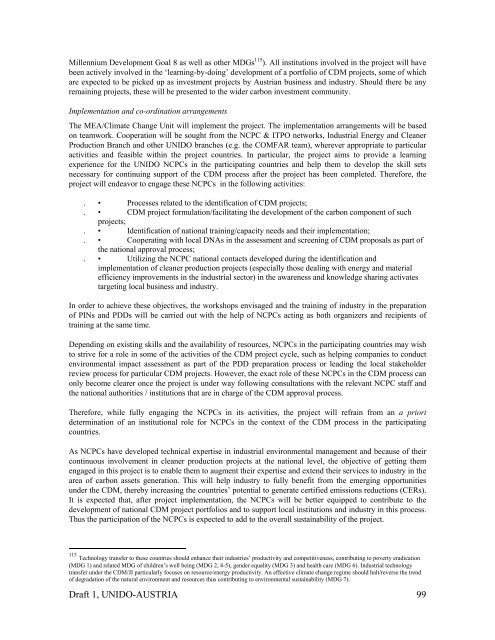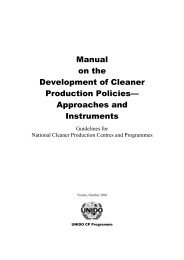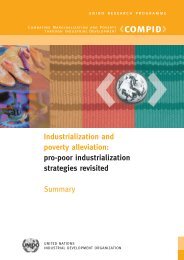mexico, support for the development and uptake of - Unido
mexico, support for the development and uptake of - Unido
mexico, support for the development and uptake of - Unido
Create successful ePaper yourself
Turn your PDF publications into a flip-book with our unique Google optimized e-Paper software.
Millennium Development Goal 8 as well as o<strong>the</strong>r MDGs 115 ). All institutions involved in <strong>the</strong> project will have<br />
been actively involved in <strong>the</strong> ‘learning-by-doing’ <strong>development</strong> <strong>of</strong> a portfolio <strong>of</strong> CDM projects, some <strong>of</strong> which<br />
are expected to be picked up as investment projects by Austrian business <strong>and</strong> industry. Should <strong>the</strong>re be any<br />
remaining projects, <strong>the</strong>se will be presented to <strong>the</strong> wider carbon investment community.<br />
Implementation <strong>and</strong> co-ordination arrangements<br />
The MEA/Climate Change Unit will implement <strong>the</strong> project. The implementation arrangements will be based<br />
on teamwork. Cooperation will be sought from <strong>the</strong> NCPC & ITPO networks, Industrial Energy <strong>and</strong> Cleaner<br />
Production Branch <strong>and</strong> o<strong>the</strong>r UNIDO branches (e.g. <strong>the</strong> COMFAR team), wherever appropriate to particular<br />
activities <strong>and</strong> feasible within <strong>the</strong> project countries. In particular, <strong>the</strong> project aims to provide a learning<br />
experience <strong>for</strong> <strong>the</strong> UNIDO NCPCs in <strong>the</strong> participating countries <strong>and</strong> help <strong>the</strong>m to develop <strong>the</strong> skill sets<br />
necessary <strong>for</strong> continuing <strong>support</strong> <strong>of</strong> <strong>the</strong> CDM process after <strong>the</strong> project has been completed. There<strong>for</strong>e, <strong>the</strong><br />
project will endeavor to engage <strong>the</strong>se NCPCs in <strong>the</strong> following activities:<br />
. • Processes related to <strong>the</strong> identification <strong>of</strong> CDM projects;<br />
. • CDM project <strong>for</strong>mulation/facilitating <strong>the</strong> <strong>development</strong> <strong>of</strong> <strong>the</strong> carbon component <strong>of</strong> such<br />
projects;<br />
. • Identification <strong>of</strong> national training/capacity needs <strong>and</strong> <strong>the</strong>ir implementation;<br />
. • Cooperating with local DNAs in <strong>the</strong> assessment <strong>and</strong> screening <strong>of</strong> CDM proposals as part <strong>of</strong><br />
<strong>the</strong> national approval process;<br />
. • Utilizing <strong>the</strong> NCPC national contacts developed during <strong>the</strong> identification <strong>and</strong><br />
implementation <strong>of</strong> cleaner production projects (especially those dealing with energy <strong>and</strong> material<br />
efficiency improvements in <strong>the</strong> industrial sector) in <strong>the</strong> awareness <strong>and</strong> knowledge sharing activates<br />
targeting local business <strong>and</strong> industry.<br />
In order to achieve <strong>the</strong>se objectives, <strong>the</strong> workshops envisaged <strong>and</strong> <strong>the</strong> training <strong>of</strong> industry in <strong>the</strong> preparation<br />
<strong>of</strong> PINs <strong>and</strong> PDDs will be carried out with <strong>the</strong> help <strong>of</strong> NCPCs acting as both organizers <strong>and</strong> recipients <strong>of</strong><br />
training at <strong>the</strong> same time.<br />
Depending on existing skills <strong>and</strong> <strong>the</strong> availability <strong>of</strong> resources, NCPCs in <strong>the</strong> participating countries may wish<br />
to strive <strong>for</strong> a role in some <strong>of</strong> <strong>the</strong> activities <strong>of</strong> <strong>the</strong> CDM project cycle, such as helping companies to conduct<br />
environmental impact assessment as part <strong>of</strong> <strong>the</strong> PDD preparation process or leading <strong>the</strong> local stakeholder<br />
review process <strong>for</strong> particular CDM projects. However, <strong>the</strong> exact role <strong>of</strong> <strong>the</strong>se NCPCs in <strong>the</strong> CDM process can<br />
only become clearer once <strong>the</strong> project is under way following consultations with <strong>the</strong> relevant NCPC staff <strong>and</strong><br />
<strong>the</strong> national authorities / institutions that are in charge <strong>of</strong> <strong>the</strong> CDM approval process.<br />
There<strong>for</strong>e, while fully engaging <strong>the</strong> NCPCs in its activities, <strong>the</strong> project will refrain from an a priori<br />
determination <strong>of</strong> an institutional role <strong>for</strong> NCPCs in <strong>the</strong> context <strong>of</strong> <strong>the</strong> CDM process in <strong>the</strong> participating<br />
countries.<br />
As NCPCs have developed technical expertise in industrial environmental management <strong>and</strong> because <strong>of</strong> <strong>the</strong>ir<br />
continuous involvement in cleaner production projects at <strong>the</strong> national level, <strong>the</strong> objective <strong>of</strong> getting <strong>the</strong>m<br />
engaged in this project is to enable <strong>the</strong>m to augment <strong>the</strong>ir expertise <strong>and</strong> extend <strong>the</strong>ir services to industry in <strong>the</strong><br />
area <strong>of</strong> carbon assets generation. This will help industry to fully benefit from <strong>the</strong> emerging opportunities<br />
under <strong>the</strong> CDM, <strong>the</strong>reby increasing <strong>the</strong> countries’ potential to generate certified emissions reductions (CERs).<br />
It is expected that, after project implementation, <strong>the</strong> NCPCs will be better equipped to contribute to <strong>the</strong><br />
<strong>development</strong> <strong>of</strong> national CDM project portfolios <strong>and</strong> to <strong>support</strong> local institutions <strong>and</strong> industry in this process.<br />
Thus <strong>the</strong> participation <strong>of</strong> <strong>the</strong> NCPCs is expected to add to <strong>the</strong> overall sustainability <strong>of</strong> <strong>the</strong> project.<br />
115 Technology transfer to <strong>the</strong>se countries should enhance <strong>the</strong>ir industries’ productivity <strong>and</strong> competitiveness, contributing to poverty eradication<br />
(MDG 1) <strong>and</strong> related MDG <strong>of</strong> children’s well being (MDG 2, 4-5), gender equality (MDG 3) <strong>and</strong> health care (MDG 6). Industrial technology<br />
transfer under <strong>the</strong> CDM/JI particularly focuses on resource/energy productivity. An effective climate change regime should halt/reverse <strong>the</strong> trend<br />
<strong>of</strong> degradation <strong>of</strong> <strong>the</strong> natural environment <strong>and</strong> resources thus contributing to environmental sustainability (MDG 7).<br />
Draft 1, UNIDO-AUSTRIA 99
















